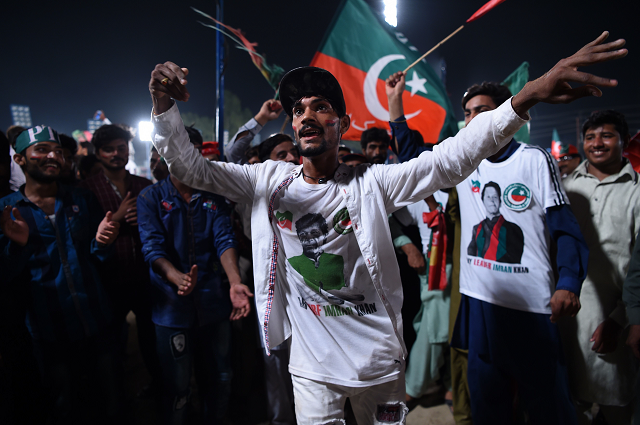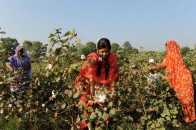Curtain falls on electioneering as Pakistan gears up to vote
ECP declares July 25 public holiday; polling scheduled to take place from 8am to 6pm

Parties also staunchly criticised each other for their performance and their past with promises wrapped in emotional slogans and touching songs to unify and charge voters.
PHOTO:AFP
Slurs, mudslinging, blasts and dragging rivals into controversies with show of political power through every tool of communication have outdone all the previous campaigns in the country.
The campaign geared up about a month ago with gloomy incidents of terrorism in different parts of the country but still thousands attended massive rallies, corner meetings and candidates visited their constituencies to woo voters.
The Election Commission of Pakistan (ECP) has declared July 25 a public holiday across Pakistan keeping in view convenience of the voters.
The polling is scheduled to take place from 8am to 6pm throughout the country on Wednesday. However, the balloting time can be extended in case of any untoward incident, said the election control body.
Law & order
Largely the traditional zest and zeal was marred by deteriorating law and order situation that claimed over 200 lives of common people including three election candidates claimed by terrorist organisations in a string of suicides attacks.
A Pakistan Tehreek-e-Insaf (PTI) candidate Ikramullah Gandapur was killed in a suicide attack in Dera Ismail Khan on July 22 while one of the deadliest such blasts occurred in the rally of Siraj Raisani ,a candidate of the Balochistan Awami Party (BAP) in which 150 people including Raisani were killed.
Rock the vote: Pakistani political music keeps the party going
Awami National Party’s candidate in Peshawar Haroon Bilour was also assassinated in a suicide blast while Jamiat Ulema Islam-Fazal’s Akram Khan Durrani survived two attacks while campaigning.
Campaigning
Following the usual election flavour, political parties and candidates used every possible means to accuse, defame and humiliate their rival(s) through traditional and other mediums. But this time of the election was different from the previous ones in which smartly recorded television ads were broadcast across mainstream television networks but social media remained the most powerful tool for campaigning.
To their sheer luck, the Election Commission of Pakistan (ECP) developed a code of conduct for the print and electronic media which lacked any such clear-cut mention about the limit and amount of TV campaigns. Same was the case with social media which turned out to be the actual battlefield for parties.
The main parties in the electoral fray are Pakistan Muslim League-Nawaz (PML-N), Pakistan Tehreek-e-Insaf (PTI) and Pakistan Peoples Party (PPP). Arch-rivals PTI and PML-N remained at the forefront in naming and shaming each other for their performance in their provinces.
Both these parties held large rallies in different parts of the county whereby Imran Khan’s PTI did not lag behind but faced embarrassment in Jhelum, Lahore and Khanspur where the turnout was way below expectations. PTI insiders term poor planning besides ‘flying visits’ of party’s chief for the situation.
Both parties also staunchly criticised each other for their performance and their past with promises wrapped in emotional slogans and touching songs to unify and charge voters.
However, PPP surprised many experts where its chairman, Bilawal Bhutto Zardari led the campaign with cool-headedness and held impressive rallies in Punjab which was considered a ‘lost territory’ for the party.
Meanwhile, Muttahida Qaumi Movement-Pakistan (MQM-P), and Pak Sarzameen Party (PSP) also held their rallies in Karachi followed by PTI and PML-N and other small parties.
In Khyber-Pakhtunkhwa(K-P), ANP and Muttahida Majlis-e-Amal (MMA) went full throttle campaigning in Bannu, Karak, Dera Ismail Khan, Mardan and northern parts of the province despite serious security threats.
Similarly, for the first time in the tribal areas political campaigns were witnessed after their merger with K-P for 12 of their National Assembly seats.
Pitched battles were fought on social media which was rife with trolls, bots, fake news and propaganda of every kind. Unlike the previous election, this time almost every major political party established its own social media cell with senior party leaders supervising it.
Interviews, tweets, surveys and reports of political leaders or rival parties were cherry-picked and shared in a way showing others in negative light while praising their own.
Interestingly, a long list of buzzwords became the most discussed topics on both social and traditional media including Judiciary, establishment, khalai-makhlooq (aliens). Television was another medium where ads of parties and candidates were canvassing for people to vote and back their manifestoes.
The ECP also came under fire for extending magisterial powers to army personnel manning polling stations while the polls body kept clarifying its position and in the end limited those powers through a press release.


















COMMENTS
Comments are moderated and generally will be posted if they are on-topic and not abusive.
For more information, please see our Comments FAQ